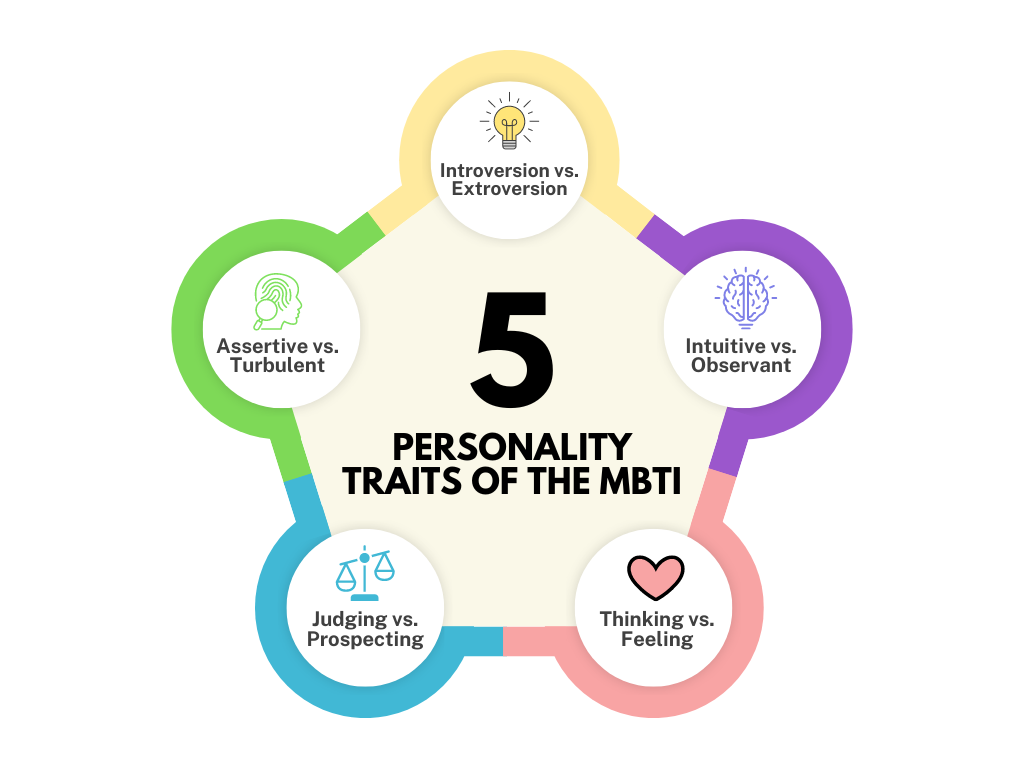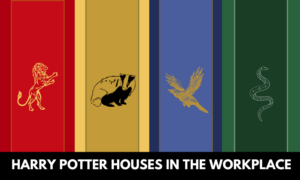Ever wondered why some coworkers thrive in brainstorming sessions while others excel at detailed project planning? The answer might lie in their personality type.
The internet is oversaturated with quizzes featuring questions like “pick your favorite bakery items and we’ll tell you when you’ll meet the love of your life.” These types of quizzes, while fun, have no scientific basis; but, there are people who study personality with credible assessments.
Personality psychology is a branch of the field focused on discovering what makes people who they are. Since studying someone’s personality is a bit abstract, it makes it hard to measure. Nonetheless, many assessments have been created such as the famous Myers-Briggs Type Indicator (MBTI).
The MBTI is a self-report assessment that breaks down our personality into 5 trait spectrums. These 5 traits include: Energy, Mind, Nature, Tactics, and Identity. At the end of the assessment you are given a 5 letter acronym that includes the specific traits unique to you. There are 16 possible combinations, so let’s break down each trait to understand where these 16 options come from.

Energy – Introversion vs. Extroversion
This trait refers to how you interact with your surroundings. If you stand in a crowded room, do you feel energized by the sheer amount of buzz in the room or do you feel overwhelmed with the urge to retreat to a quiet, secluded place? You may also feel both at the same time, but these questions assess where you fall on the Introversion-Extroversion spectrum.
A common misconception about Introverts (I) is that they don’t enjoy being around people. While true some of the time, this is false for most people. Introverts can be great with people. What defines this personality trait is that they tend to feel their energy drain when around people, and prefer to engage in activities on their own.
Extroverts (E), on the other hand, get their energy from being around others. These are the people who likely lead conversations and are always looking for something to do. Extroverts are very dynamic and can easily become the center of attention, making them effective leaders.
Mind – Intuitive vs. Observant
The next personality trait refers to what people do with the intake of information from their surroundings. The central question to this trait is: are you more Intuitive or more Observant?
People who fall more towards the Intuitive (N) end of the scale tend to have a highly active inner mind and imagination. They like to ponder abstract concepts that other people find to be a waste of time. These are the people who will discuss hyper obscure topics such as “what would happen if aliens lived on Earth?”
This doesn’t mean that people who fall more towards the Observant side don’t think like this, though. Those with the Observant (S) trait simply tend to lean more on the facts and logic of a situation. They like to see what’s right in front of them, which makes them very practical people. These are the people who get things done and like to see results.
Nature – Thinking vs. Feeling
When you make choices do you rely on your head or your heart? This personality trait asks whether you prefer to use your emotions or rationale to make decisions.
People who rely on their head are those with the Thinking (T) trait. They look at the objective facts and deduce what the most effective solution or outcome may be. When considering which is more important in their relationships, taking into account the feelings of others is not usually one of their first priorities. Rather, they like to evaluate all the facts and come to the most effective solution.
On the other hand, those with the Feeling (F) personality trait tend to be more in touch with their own emotions, and therefore, rely on them to make decisions. When considering the people around them, they lean towards ensuring the well-being of all involved. This mindset doesn’t mean they don’t have any logic though, it just looks different.
Tactics – Judging vs. Prospecting
This trait refers to how people plan out their life and deal with the choices they have available to them. It often assesses if people are more comfortable with flexibility, or if they prefer to have an element of routine.
Those with the Judging (J) trait are more comfortable creating a set plan and having clear guidelines. They want things to feel like an outlined list so that it makes sense. They also don’t often like deviating from this list and really enjoy completing tasks.
Those with the Prospecting (P) trait are much more flexible and don’t mind things to be a “go with the flow” type of situation. Because they usually enjoy spontaneity, they are skilled at reacting to their environments and adapting accordingly.
Identity – Assertive vs. Turbulent
This last trait is the glue that holds all the other trait spectrums together. It refers to our level of confidence, how we view achievement, and how we handle stress.
Those who hold the Assertive (-A) trait handle challenges with a calm, cool, and collected energy. Stress doesn’t paralyze them and they feel confident in their ability to rise to the challenge. They likely don’t dwell on past mistakes or missteps, but rather keep their eyes moving forward towards their next goal.
On the other hand, those with the Turbulent (-T) trait have the same desire for success and achieving their goals, but when confronted with barriers, it affects them more than those who are more assertive. They can often struggle with self-doubt and getting caught up in things that didn’t go well in the past. This being said, they tend to have a need to succeed, and therefore, use these things as motivators to be better and overcome.
Okay, this is great and all, but what’s the point? Based on this small outline, you may already feel like you’ve been read like a book. But, we’re not done yet. These are only pieces of the larger puzzle. In order to fully understand your full MBTI, you have to put it all together. There is a huge value in knowing your full report, especially in a work setting.
MBTI in Professional Development
When you step into work, your personality doesn’t just leave your body. It stays with you through everything you do, including your everyday tasks. It affects how you work in a team, your learning style, the way that you view your professional goals, as well as how you grow in your role.
It’s an incredible tool for employers to use on their team so that leaders know how to better manage their employees. It’s also a great way for employees to understand their weaknesses and how to use this self-awareness to grow.
For example, let’s say you take the test and discover you’re an INFJ-A type. As a refresher, this means you have the Introvert (I), Intuitive (N), Feeling (F), Judging (J), and Assertive (-A) traits. Knowing as a whole, the most rewarding work will be that which you get to make a difference and develop as a person, will help you discern which career paths might not be a good fit.
Additionally, as you’re the Intuitive type, you’re known for being able to think outside the box and have a deep connection with the theoretical world. This can have the trade-off of lacking practicality, thus with this knowledge you can understand this part of your personality and know where you can work to balance the two.
In the coming months, we will be examining each of the 16 personality types. Beyond the traits themselves, we will deep dive into these 16 through their 4 role groups: Analysts, Diplomats, Sentinels, and Explorers. Together we will explore the value of understanding the MBTI personalities in a professional setting.
Stay tuned for the first deep dive on the Advocates coming soon!
Do you follow us on social media?
Check out our Linktree to download our StaffNow app and to learn more!
In other news…
About LGC
Since 2003 LGC has been building connections between businesses with staffing needs and job seekers looking for new opportunities. Our range of solutions includes temporary and permanent placements (and everything in between) for a variety of industries. With offices located nationwide, we can tap into a dynamic pool of talented professionals. We have a passion for creating partnerships that last and work hard every day to ensure both clients and candidates reach their employment goals.





